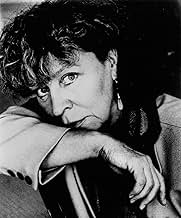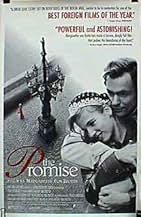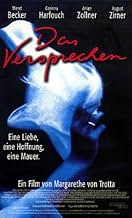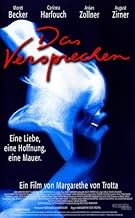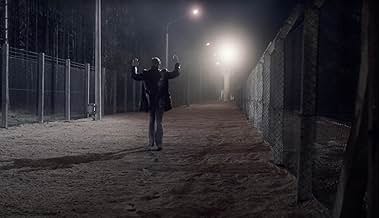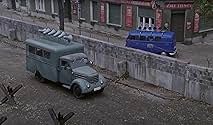Ost-Berlin, 1961, kurz nach der Errichtung der Mauer. Konrad, Sophie und drei ihrer Freunde planen eine gewagte Flucht in den Westen Deutschlands. Der Versuch ist erfolgreich, mit Ausnahme v... Alles lesenOst-Berlin, 1961, kurz nach der Errichtung der Mauer. Konrad, Sophie und drei ihrer Freunde planen eine gewagte Flucht in den Westen Deutschlands. Der Versuch ist erfolgreich, mit Ausnahme von Konrad, der zurückbleibt.Ost-Berlin, 1961, kurz nach der Errichtung der Mauer. Konrad, Sophie und drei ihrer Freunde planen eine gewagte Flucht in den Westen Deutschlands. Der Versuch ist erfolgreich, mit Ausnahme von Konrad, der zurückbleibt.
- Regie
- Drehbuch
- Hauptbesetzung
- Auszeichnungen
- 4 Gewinne & 3 Nominierungen insgesamt
Simone von Zglinicki
- Konrad's mother
- (as Simone von Zglienicki)
Joerg Meister
- Alexander - 20 years
- (as Jörg Meister)
Empfohlene Bewertungen
10mail-156
As the film covers 30 years, the key emotional points of such a story are incredibly accurate. The film's tone is brilliantly handled, the delicate weakening of the spirit, the darkening of the world, the East buildings subtly not changing but getting older while the West becomes subtly more modern. Unless one lived through much of the story, much may be missed. But every detail is important. Credit to the director, the writer and the actors for incredible performances: the repressed anger, the repressed joy, the repressed hope... everything just below the surface. Forever, the question, who could have done what differently? There was never an answer then, and there is no answer now.
When the Berlin wall is built to split up the city, a group of youths try to escape from the East to the West. Among them are Sophie (Meret Becker) and Konrad (Anian Zollner), but only the former makes it to the west. Konrad stays in the East, becoming a successful astronomer. Over the following decades, the lovers keep on living their lives with new families, occasionally meeting each other when circumstances are benign. Older versions of Sophie and Konrad are played by Corinna Harfouch and August Zirner.
Through the melodramatic romance of Sophie and Konrad, the film examines the effects of the Wall on the Germans. Things are more complicated than "East is bad, West is good": there are movements to both directions, and people have many reasons to move, or to choose to stay. The film conveys the atmosphere of disunity and bureaucracy well through realistic visual style, but the love story is strong in its own right too.
Through the melodramatic romance of Sophie and Konrad, the film examines the effects of the Wall on the Germans. Things are more complicated than "East is bad, West is good": there are movements to both directions, and people have many reasons to move, or to choose to stay. The film conveys the atmosphere of disunity and bureaucracy well through realistic visual style, but the love story is strong in its own right too.
10sam89-1
I first saw this in a German language class, and even though I'm no where near fluent, I still find this to be more enjoyable and moving than many English movies. Following the lives of two main characters, the film chronicles the period just after the wall's construction to the fall in 1989. Though all protagonist characters are of course impacted negatively by the wall, the politics of a few characters are very complex and surprising. This movie will undoubtedly make you think. Aside from politics, the main plot is a love story, and it is very powerful. The characters are imperfect, real and delightful. All in all it is evocative, emotional, and never trite. Great film.
In an interview at the time of the release of this film Margarete von Trotta rather bragged about the fact that this was the first German (after unification) film after the fall of the Berlin wall that dealt with the 28 years of history on the East side of the wall. This remains to be seen, but if so, is that a good reason to come up with this dim, tepid and obligatory romantic drama that is predictable from scene 1? A drama in which the viewer no cliche spared?
The film looks more a kaleidoscope of political events in which the two main characters just happened to be a part of. The film never is a real drama and lacks every dramatic tension. The two main characters are simply boring people (not helped much by the casting); all other characters are one-dimensional. Some bad writing is also present: some characters, like the aunt, simply disappear from the story. As to direction and filmmaking there are plenty of uneasy moments as well. In the Prague scene the girl waits on the wrong spot for her friend; well, they just wait, but then "pop" a short scene in which she asks where this or that place is and then "pop": yes, there he is! The scene of the father in hospital also just seems to come from nowhere.
It all looks like as Von Trotta really wanted to show how very, very concerned she was about the 28 years of history and by that overplaying her hand. She should either have elaborated the drama more, or have taken the trouble for a more thorough interpretation of the political situation. As it is now it is a "everything political happens to poor us" drama. (5/10)
The film looks more a kaleidoscope of political events in which the two main characters just happened to be a part of. The film never is a real drama and lacks every dramatic tension. The two main characters are simply boring people (not helped much by the casting); all other characters are one-dimensional. Some bad writing is also present: some characters, like the aunt, simply disappear from the story. As to direction and filmmaking there are plenty of uneasy moments as well. In the Prague scene the girl waits on the wrong spot for her friend; well, they just wait, but then "pop" a short scene in which she asks where this or that place is and then "pop": yes, there he is! The scene of the father in hospital also just seems to come from nowhere.
It all looks like as Von Trotta really wanted to show how very, very concerned she was about the 28 years of history and by that overplaying her hand. She should either have elaborated the drama more, or have taken the trouble for a more thorough interpretation of the political situation. As it is now it is a "everything political happens to poor us" drama. (5/10)
I can only praise the makers of this film, because many people did not experience it and unhappily, some do not want to hear about it. A female friend of mine recently told me, that now she knows why the Berlin Wall was built. Why, I asked. "Because the Russians didn't want the Americans to come in." It would be laughable, if it wasn't so sad. This is a person with university education and supposedly she never heard of people trying to get out of East Berlin or other communist countries. Most people form their opinions in their youth and many are not able to change their minds and admit to themselves, let alone to others, that they were wrong. Simply they ignore the facts. By the way, even after the wall went up, the Americans still could go to East Berlin, if they so desired. It was built to keep ordinary people in, because East Germans were leaving through Berlin in alarming numbers.
Wusstest du schon
- Zitate
[When the Berlin Wall comes down]
Woman: When the cage opens after thirty years, you can't fly anymore.
- VerbindungenFeatured in Die Neugier immer weiter treiben (1995)
Top-Auswahl
Melde dich zum Bewerten an und greife auf die Watchlist für personalisierte Empfehlungen zu.
- How long is Das Versprechen?Powered by Alexa
Details
Box Office
- Bruttoertrag in den USA und Kanada
- 91.145 $
- Laufzeit1 Stunde 55 Minuten
- Farbe
- Sound-Mix
- Seitenverhältnis
- 1.66 : 1
Zu dieser Seite beitragen
Bearbeitung vorschlagen oder fehlenden Inhalt hinzufügen

